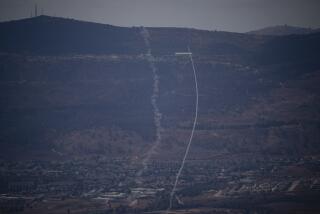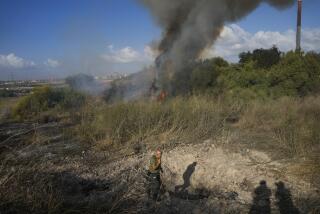Israel has 80 nuclear warheads, can make 115 to 190 more, report says
JERUSALEM-- Israel has 80 nuclear warheads and the potential to double that number, according to a new report by U.S. experts.
In the Global Nuclear Weapons Inventories, recently published in the Bulletin of the Atomic Scientists, proliferation experts Hans M. Kristensen and Robert S. Norris write that Israel stopped production of nuclear warheads in 2004.
But the country has enough fissile material for an additional 115 to 190 warheads, according to the report, meaning it could as much as double its arsenal.
Previous estimates have been higher but the new figures agree with the 2013 Stockholm International Peace Research Institute yearbook on armament and international security. The yearbook estimated 50 of Israel’s nuclear warheads were for medium-range ballistic missiles and 30 were for for bombs carried by aircraft, according to a report in the Guardian.
Although widely assumed a nuclear power, Israel has never acknowledged possessing nuclear weapons or capabilities and continues to maintain its decades-old “strategic ambiguity” policy on the matter, neither confirming nor denying foreign reports on the issue.
In 1986, Mordechai Vanunu, an Israeli nuclear technician, leaked the country’s alleged nuclear secrets to a British newspaper, and said Israel had at least 100 nuclear weapons. Vanunu was later convicted of espionage and treason and was released from jail in 2004 after serving 17 years.
Israel continued to adhere to its vagueness policy after comments made by then-Prime Minister Ehud Olmert in 2006 were interpreted by many as an inadvertent confirmation that Israel had nuclear weapons.
Following Sunday’s reports, Israeli defense analyst Amir Oren wrote that the ambiguity policy has done “its duty honorably and can now retire.” In the current regional conditions, Israel could benefit from giving up the vagueness, he wrote in Haaretz.
Founded in 1952, the Israel Atomic Energy Commission, is nearly as old as the state. It acknowledges two “nuclear research centers,” one in central Israel, the other in the Negev desert.
The facility at Soreq is under supervision of the IAEA, the International Atomic Energy Agency, whose inspectors routinely ensure it is being used for research purposes only.
Earlier this year, an IAEA team inspected the facility at Israel’s request for a first-ever comprehensive safety review, a concern after the nuclear accident at Fukushima, Japan, in 2011.
The 40-year-old facility at Soreq is expected to be phased out by the end of the decade and replaced with a particle accelerator, according to Israeli media.
But the nuclear facility in Dimona, a location in Israel’s southern Negev desert, is off-limits for the IAEA and not under its supervision. According to foreign reports, that is where the nuclear warheads have been produced since 1967.
Of the many multilateral agreements on nuclear issues the IAEA offers, Israel has signed a few and ratified fewer, mostly relating to nuclear safety issues. But it is not a party to the Treaty on the Non-Proliferation of Nuclear Weapons. In 2010, Israel dismissed a demand from the parties to join.
(A letter from Henry Kissinger to President Nixon in 1969 describes U.S. concerns that Israel “make no visible introduction of nuclear weapons” or “undertake a nuclear test program”. According to the letter, the Israeli government told the U.S. it “would not become a nuclear power.”)
ALSO:
Egypt’s Hosni Mubarak is back in court -- but not for long
Riot police in Mexico clear teachers from historic Zocalo square
Philippine Muslim rebels agree to cease-fire, still hold hostages
More to Read
Sign up for Essential California
The most important California stories and recommendations in your inbox every morning.
You may occasionally receive promotional content from the Los Angeles Times.










